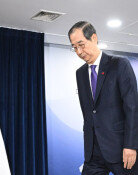[Opinion] Ulzzang
A new netizen term that the older generation should get used to has appeared. They just succeeded in learning the term ulzzang (a person who has a supermodel-like face), but now a new term, gangzzang, has become a hot issue. This term originated from a new term, gangdo-ulzzang, (gangdo means burglar in Korean) which came from the name of a gorgeous-looking burglar wanted by police.
Netizens have showed quite a variety of responses to the burglar. I cant believe it. How could you commit burglary with such supermodel-like looks? was one response. Surrender to the police and become a talent, was another. A term indicating discrimination based on appearance, lookism, was listed in the Merriam-Webster dictionary last year. Taking that one step further, Koreans have created new ulzzang and gangzzang syndromes and added internet technology to lookism. How great Korean internet culture is!
Is it really a great blessing to be pretty? Everybody asks, but it has been proven scientifically. Last year the University of Oslo conducted an experiment with students and the results showed that good-looking people get 20 percent lighter sentences than typical criminals. American scientist David Berth proved that appearance tops the first condition for brides in 37 civilizations in general. Unexpectedly the reasons are scientific. Big eyes and white skin represent youth and good health. A womans slender waist and plump bottom are signs that she can give babies well. These tell us that genetic maneuvering has created the appearance of favoritism.
The tendency of looking for a good-looking life partner relies on personal choice even though we cant ignore the negative social effects of ulzzang. It seems that enthusiastic attention to gangzzang would be not a big deal since the law takes effect everywhere and always. The worrisome problem is that the trend of worshipping ulzzang crosses over to politics. Each political party makes efforts to win handsome and beautiful broadcasting anchors to their sides, and politicians pay greater attention to making good and stylish impressions instead of developing their political capabilities and convictions. It seems highly possible that cameras will replace the power of voters from now on.
The Philippines can be used as a good case of how it affects a nation if the electorate votes for ulzzang in their political leaders. Famous actor-turned-president Joseph Estrada, who won the election in 1998, was ousted by a mass uprising due to his corruption, bribe receiving, and failed economic policies within three years of taking office. When Fernando Poe announced his bid for the presidency this time, the stock market showed signs of collapse and the value of the peso dropped dramatically. The reason pie in the sky looks tasty is that pie does not exist in reality. Likewise, ulzzang can be valued properly only when it is on screen. I would be afraid if unexamined jeongzzang (ulzzang in politics) interferes with real politics.
Editorial Writer Kim Soon-duk, yuri@donga.com







